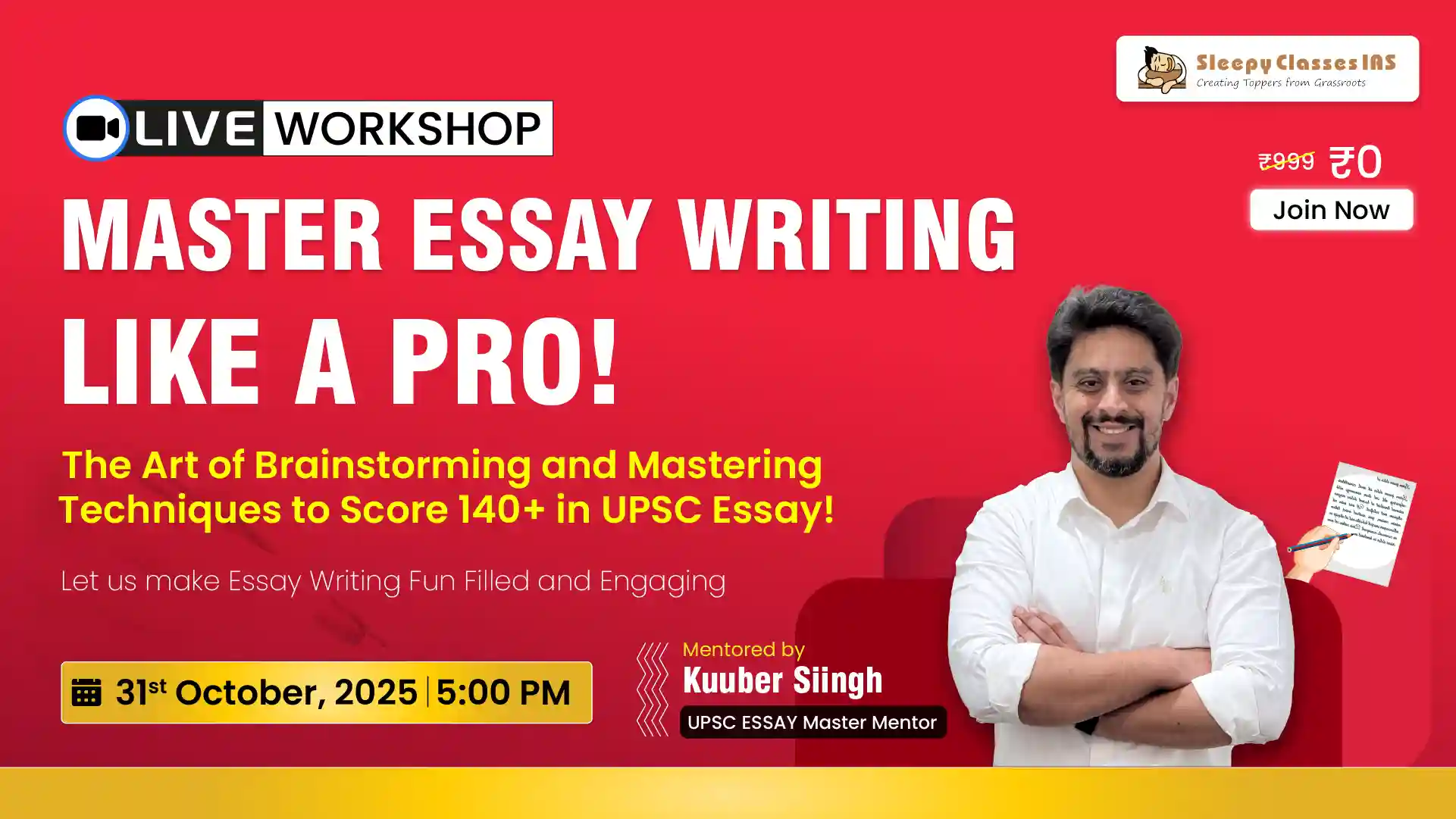Preparing for the UPSC (Union Public Service Commission) examination is a significant undertaking that requires a strategic approach to studying. Aspirants often find themselves at a crossroads, trying to decide whether to study in a group or go solo. Both methods have their unique advantages and challenges. This article delves into the pros and cons of group study and solo study for UPSC preparation, providing insights to help you choose the best approach for your needs.
Key Takeaways
- Group study offers collaborative learning and peer support, which can be beneficial for clearing doubts and staying motivated.
- Solo study provides the flexibility to tailor your study schedule and focus on individual weaknesses without distractions.
- Effective group study requires well-structured sessions and a commitment from all members to stay on track.
- Solo study demands a high level of self-discipline and time management skills to cover the vast UPSC syllabus efficiently.
- Combining both group and solo study methods can provide a balanced approach, leveraging the benefits of both strategies.
Understanding Group Study for UPSC
Group study can be a powerful tool for UPSC aspirants. It involves collaborative learning where students come together to share knowledge, discuss topics, and solve problems collectively. This approach can be particularly beneficial for a comprehensive exam like UPSC, which covers a wide array of subjects.
Exploring Solo Study for UPSC
Advantages of Solo Study
Solo study offers a high degree of flexibility, allowing aspirants to create a personalized study schedule that fits their unique needs. Self-study for UPSC requires discipline and a strategic approach. By focusing on core resources and staying updated with current affairs, candidates can tailor their preparation to their strengths and weaknesses. Additionally, solo study eliminates the distractions that can come with group study, enabling a more concentrated and efficient learning process.
Drawbacks of Solo Study
One of the main challenges of solo study is the potential for isolation. Without the presence of like-minded aspirants, it may be challenging to exchange knowledge and gain different perspectives. This lack of peer learning can impact motivation and consistency, making the long and demanding journey of UPSC preparation even more difficult. Moreover, self-study requires a high level of self-discipline and time management skills, which can be hard to maintain over an extended period.
Tips for Successful Solo Study
- Create a Study Schedule: Plan your study time effectively, breaking down the syllabus into manageable sections.
- Utilize Online Resources: Make use of digital platforms, online courses, and study materials to enhance your preparation.
- Join Online Study Groups: Engage in online forums and study groups to exchange ideas and clear doubts.
- Practice Mock Tests: Regularly take mock tests to assess your progress and identify areas for improvement.
- Self-Evaluate: Continuously evaluate your performance and adjust your study plan as needed.
Remember, UPSC Civil Services Exam is a marathon, not a sprint. It requires consistent effort, hard work, and dedication.
By following these tips, aspirants can effectively navigate the challenges of solo study and achieve success in the UPSC examination.
Comparative Analysis: Group Study vs. Solo Study
When preparing for the UPSC exam, choosing between group study and solo study can significantly impact your success. Each method has its own set of advantages and challenges, and understanding these can help you make an informed decision.
Efficiency and Productivity
Group study can enhance efficiency through collaborative learning. Discussing topics with peers can help clarify doubts and provide different perspectives. However, it can sometimes lead to distractions and off-topic discussions. Solo study, on the other hand, allows for focused and uninterrupted study sessions, but requires a high level of self-discipline and motivation.
Flexibility and Convenience
Solo study offers greater flexibility as you can create your own schedule and study at your own pace. This is particularly beneficial for those who have other commitments. Group study requires coordinating with others, which can be challenging but also provides a structured study routine.
Impact on Mental Health
Studying in a group can provide emotional support and reduce feelings of isolation, which is crucial during the intense UPSC preparation period. However, it can also lead to stress if group dynamics are not managed well. Solo study can be lonely, but it allows for a personalized approach to self-care and stress management.
Age and academic background are not the sole determinants of success in the UPSC CSE exam. What truly matters is your dedication, perseverance, and the study method that best suits your learning style.
Role of Technology in UPSC Preparation
In today’s digital era, technology has become an indispensable part of UPSC preparation. From mobile apps to online courses, there are numerous resources available to help aspirants. Leveraging these tools can significantly enhance your study efficiency and effectiveness.
Expert Opinions on Study Approaches
Insights from UPSC Toppers
UPSC toppers often emphasize the importance of a balanced approach. While self-study fosters independent thinking, coaching institutes provide structured guidance and additional resources. Many toppers have found that combining both methods can lead to a more comprehensive preparation strategy.
Advice from Experienced Educators
Experienced educators highlight that the choice between group study and solo study should be based on individual learning styles. They suggest that group study can enhance problem-solving skills through diverse perspectives, while solo study requires a higher level of self-discipline and motivation.
Psychological Perspectives on Learning
Psychologists suggest that a mix of both study methods can be beneficial. Group study can reduce stress by providing social support, whereas solo study allows for personalized learning paces. The key is to find a balance that aligns with your personal needs and preferences.
Recognizing the importance of expert guidance and the flexibility encouraged by self-study, it is crucial to strike a balance that aligns with your individual needs.
Customizing Your Study Plan
Assessing Personal Learning Styles
Understanding your personal learning style is crucial for effective UPSC preparation. Some students thrive in group settings, while others perform better when studying alone. By identifying your strengths and weaknesses, you can tailor your study environment to minimize interruptions and create an atmosphere conducive to learning.
Combining Group and Solo Study
A balanced approach that combines both group and solo study can be highly effective. Group study sessions can provide diverse perspectives and collaborative problem-solving opportunities. On the other hand, solo study allows for personalized learning, where you can focus on your specific strengths and weaknesses. By maintaining an individual UPSC study time table, you can have a customized approach to different subjects as per your time availability.
Adapting to Changing Needs
Your study plan should be flexible enough to adapt to changing needs and circumstances. Regularly assess your progress and make necessary adjustments to your schedule. This adaptability ensures that you remain on track and can handle any unexpected challenges that may arise during your preparation.
A well-structured study plan is crucial for UPSC preparation. Divide your time efficiently among different subjects, allocating more time to areas you find challenging. Balance is key—cover the syllabus comprehensively while allowing time for revision and mock tests.
Common Mistakes to Avoid in UPSC Preparation
Preparing for the UPSC exam is a challenging journey that requires a strategic approach. Here are some common mistakes to avoid to ensure a smooth preparation process:
Over-Reliance on One Method
Relying too much on a single study method can be detrimental. It’s essential to diversify your study techniques to cover all aspects of the vast UPSC syllabus. Incorporating various methods like group discussions, solo study, and online resources can provide a well-rounded preparation.
Neglecting Self-Care
The intense preparation can take a toll on your mental and physical health. Ignoring self-care can lead to burnout and decreased productivity. Make sure to include regular breaks, exercise, and a balanced diet in your routine to maintain your well-being.
Ignoring Feedback and Assessments
Feedback and assessments are crucial for tracking your progress. Ignoring them can result in repeated mistakes and gaps in knowledge. Regularly seek feedback from mentors and peers, and take mock tests to evaluate your preparation level.
Consistency and dedication are the keys to cracking the UPSC exam. Stay focused and keep revising regularly to ensure success.
One of the most common mistakes in UPSC preparation is not having a structured study plan. To avoid this, it’s crucial to follow a well-defined schedule and utilize comprehensive resources. At Sleepy Classes, we offer tailored courses and personal mentorship to help you stay on track. Don’t let these common pitfalls hinder your success. Visit our website to explore our UPSC programs and start your journey towards achieving your IAS dreams today!
Conclusion
In conclusion, both group study and solo study have their unique advantages and challenges when it comes to preparing for the UPSC examination. Group study offers the benefits of peer support, diverse perspectives, and collaborative learning, which can be particularly useful for clearing doubts and staying motivated. On the other hand, solo study provides the flexibility to tailor your study schedule to your personal pace and focus on individual weaknesses without distractions. Ultimately, the choice between group study and solo study depends on your personal learning style, discipline, and preferences. By understanding the strengths and limitations of each approach, you can make an informed decision that aligns with your preparation strategy. Remember, consistency, dedication, and a well-structured study plan are key to success in the UPSC exam. Good luck on your journey to becoming a civil servant!
Frequently Asked Questions
What are the main benefits of group study for UPSC preparation?
Group study offers several benefits for UPSC preparation, including collaborative learning, diverse perspectives, peer support, and shared resources. It can also help in maintaining motivation and accountability among members.
What are the challenges associated with group study for UPSC?
Challenges of group study include potential distractions, scheduling conflicts, and the possibility of unequal participation. It may also lead to dependency on others for understanding concepts.
What are the advantages of solo study for UPSC preparation?
Solo study allows for personalized learning, flexible scheduling, and focused concentration. It enables students to tailor their study plans to their individual strengths and weaknesses without external distractions.
How can I effectively balance group study and solo study for UPSC?
To balance both approaches, allocate specific times for group discussions and solo study sessions. Use group study for subjects that require discussion and solo study for subjects that need deep individual focus. Regularly assess your progress and adjust your plan accordingly.
What role does technology play in UPSC preparation?
Technology plays a significant role by providing access to online study groups, digital resources, and educational forums. It facilitates remote learning, offers diverse study materials, and enables interactive learning experiences.
How can I avoid common mistakes in UPSC preparation?
Avoid over-reliance on one study method, neglecting self-care, and ignoring feedback and assessments. Diversify your study techniques, maintain a healthy lifestyle, and regularly evaluate your progress to make necessary adjustments.





